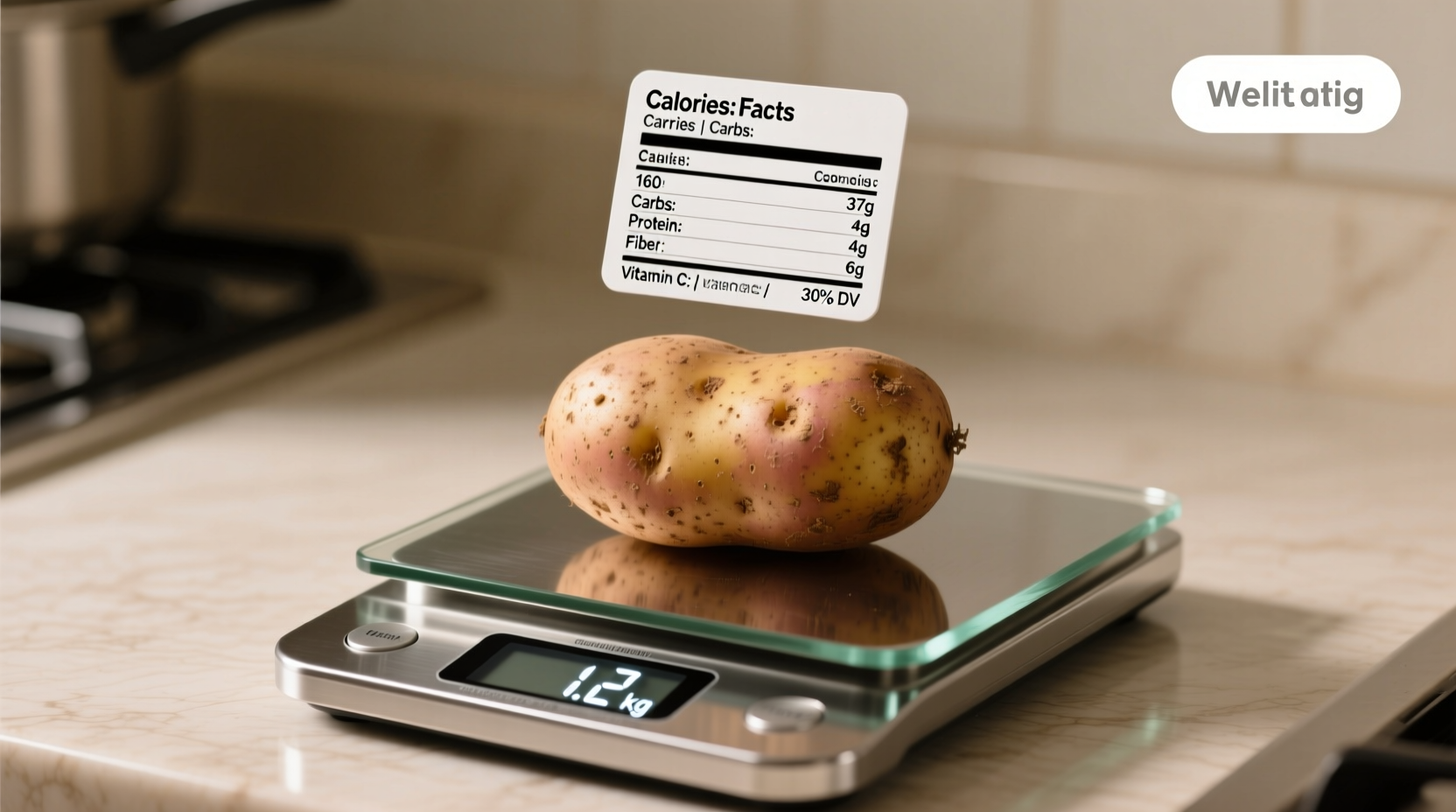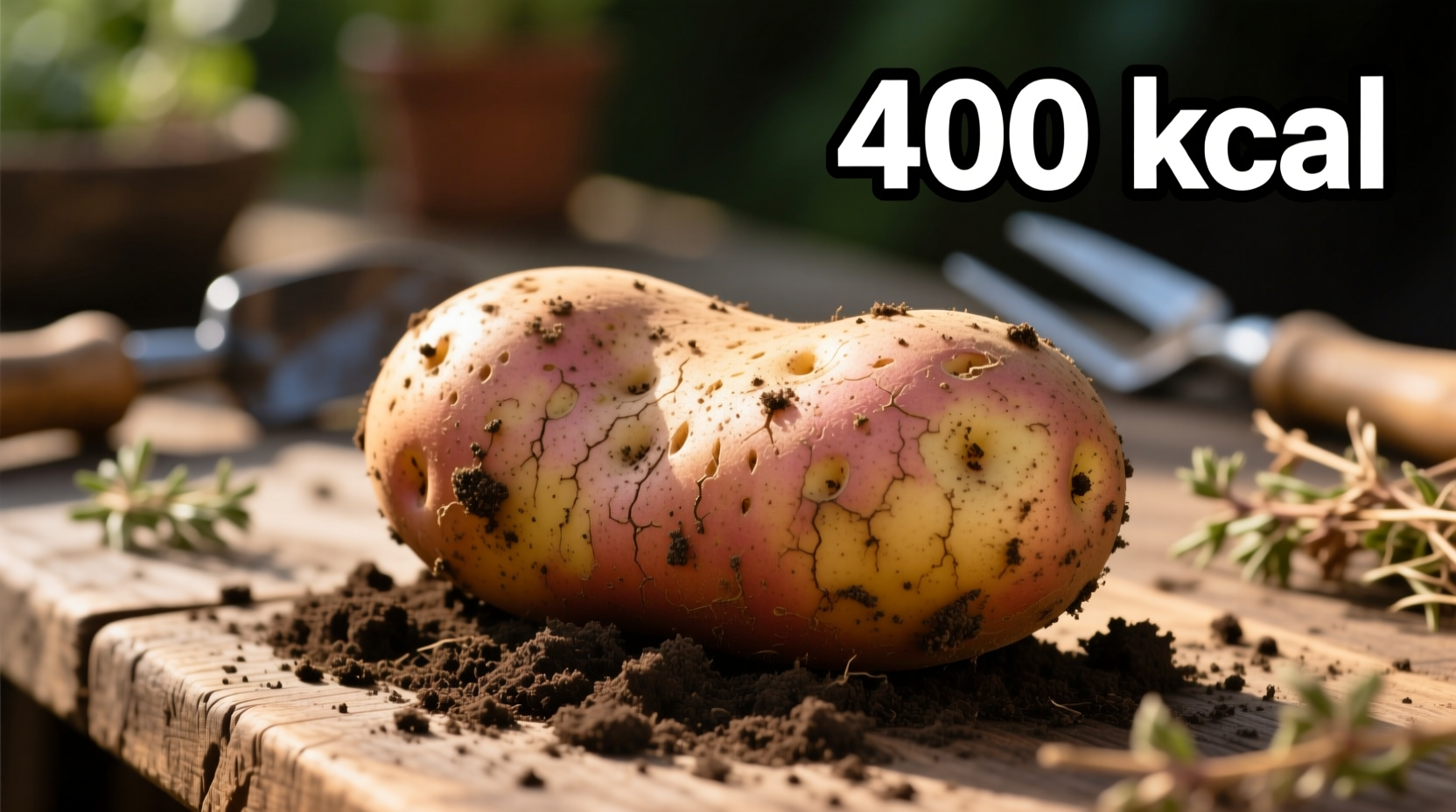Understanding Russet Potato Nutrition: What You Need to Know
When tracking your daily nutrition, knowing the exact calorie content of staple foods like russet potatoes is essential. This comprehensive guide breaks down the nutritional profile of large russet potatoes, how cooking methods affect their calorie count, and how to incorporate them into balanced meal planning.
Core Nutritional Facts of a Large Russet Potato
According to the USDA FoodData Central database, a large russet potato (about 300 grams before cooking) delivers substantial nutrition in a single serving. The beauty of russet potatoes lies in their versatility and nutrient density—they're not just "empty" carbohydrates as some believe.
| Nutrient | Amount per Large Russet Potato (300g) | % Daily Value* |
|---|---|---|
| Calories | 264 | 13% |
| Total Carbohydrates | 63g | 21% |
| Dietary Fiber | 5.5g | 20% |
| Protein | 7g | 14% |
| Potassium | 1600mg | 34% |
| Vitamin C | 42mg | 47% |
| Vitamin B6 | 0.7mg | 41% |
*Percent Daily Values are based on a 2,000 calorie diet. Your daily values may be higher or lower depending on your calorie needs.
How Potato Size Affects Calorie Count
Understanding potato sizing is crucial for accurate nutrition tracking. The USDA categorizes potato sizes as follows:
| Size Category | Weight (grams) | Calories | Carbohydrates |
|---|---|---|---|
| Small | 150g | 132 | 31.5g |
| Medium | 225g | 198 | 47g |
| Large | 300g | 264 | 63g |
| Extra Large | 375g | 330 | 79g |
This standardized sizing from the USDA FoodData Central helps eliminate confusion when tracking your intake. Many people overestimate or underestimate potato sizes, leading to inaccurate calorie counting.
Cooking Methods and Their Calorie Impact
The way you prepare your russet potato dramatically affects its final calorie content. Here's how common cooking methods change the nutritional profile:
- Baked (with skin): 290 calories for a large potato - minimal change from raw as water evaporates
- Boiled: 260 calories - slight decrease as some nutrients leach into water
- Mashed (with milk and butter): 380+ calories - significant increase depending on added fats
- Fried: 360-450 calories - absorbs oil during cooking
- Air-fried: 300-320 calories - less oil absorption than deep frying
Professional chefs like Antonio Rodriguez emphasize that "cooking technique transforms nutrition. Baking preserves maximum nutrients while frying dramatically increases calorie density through oil absorption." The skin contains nearly half the fiber, so leaving it on boosts nutritional value.

Practical Applications for Your Diet
Russet potatoes fit well into various dietary approaches when portion-controlled:
- Weight management: One large baked russet makes a satisfying, high-fiber base for meals (264 calories)
- Athletic performance: Excellent complex carbohydrate source before endurance activities
- Balanced meals: Pair with lean protein and vegetables for complete nutrition
- Dietary restrictions: Naturally gluten-free and suitable for most eating patterns
Nutrition professionals note that russet potatoes have a moderate glycemic index (around 70-85 depending on preparation), meaning they can affect blood sugar levels more than some other vegetables. However, pairing them with protein and healthy fats slows glucose absorption.
Common Misconceptions About Potato Nutrition
Several myths persist about potato nutrition that deserve clarification:
- "Potatoes are just empty carbs" - False. They provide significant potassium, vitamin C, and fiber
- "All potatoes have the same nutrition" - False. Russets have more starch but similar micronutrients to other varieties
- "Sweet potatoes are always healthier" - Context-dependent. Russets provide more potassium while sweet potatoes offer more vitamin A
- "Potatoes cause weight gain" - Only when consumed in excess or with high-calorie additions
Registered dietitians emphasize that whole, unprocessed potatoes are nutrient-dense foods that can be part of healthy eating patterns. The preparation method and portion size determine their impact on your diet.
Smart Ways to Enjoy Russet Potatoes
Maximize the nutritional benefits while keeping calories in check with these chef-recommended techniques:
- Leave the skin on - Adds fiber and nutrients while reducing preparation time
- Try roasted wedges - Toss cubed potatoes with olive oil spray, herbs, and roast for crispy texture with minimal fat
- Create balanced bowls - Fill half your plate with roasted potato chunks, one-quarter with lean protein, and one-quarter with vegetables
- Make potato salads - Use Greek yogurt instead of mayo for dressing to cut calories significantly
- Experiment with toppings - Replace butter with salsa, Greek yogurt, or herb-infused olive oil
Remember that a large russet potato provides about 20% of your daily fiber needs, making it a valuable component of a high-fiber diet that supports digestive health and satiety.











 浙公网安备
33010002000092号
浙公网安备
33010002000092号 浙B2-20120091-4
浙B2-20120091-4